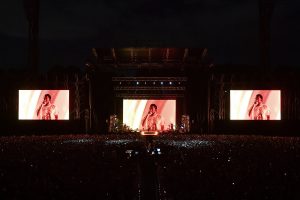K-pop dominates what foreigners know of the South Korean music scene, obscuring the large portion of the Korean population that is hugely interested in foreign artists. The influx of Western artists to South Korea over the past decade, however, showcases the demand among Korean audiences to bring foreign talent to Seoul.
This domestic demand has been fueled by increasingly globalized access to music worldwide. In 2017, over 75 percent of Korean music consumers used music streaming services. MelOn (멜론), the most popular streaming service in South Korea, has over 28 million users. Considering MelOn typically requires a Korean iTunes account to register, over half of South Korea’s total population of 51 million may be using a single music streaming platform. The marked rise in music streaming services in South Korea has undoubtedly contributed to domestic demand for foreign artists as Koreans with paid monthly subscriptions have unlimited access to international music options.
Bringing foreign artists to South Korea was in the past largely hindered by the country’s underdeveloped concert industry, which has gone through qualitative and quantitative growth in the last decade. This rapid growth serves as an indicator of the evolution and globalization of the Korean concert industry, now capable of staging shows on par with other international venues. South Korea’s rapid progress in this industry has made Seoul a more regular stopover for Western artists on tour, joining the ranks of other staple Asian cities, including Tokyo, Beijing, and Bangkok.
From 2011 to 2016, the number of live music performances in South Korea increased by over 1,400 percent, from around 750 performances to 11,755 performances, amounting to ticket sales over 427 billion South Korea won ($350 million). More so than any other large-scale concert, the Hyundai Card Super Concert series serves as an example of the development of this sector of the Korean music industry. What began with audiences of 13,000 at Super Concert’s 2007 debut has now grown to audiences of 100,000, as seen in back-to-back Coldplay performances in 2017.
At the time of Super Concert’s inception in 2007, large-scale concerts were unheard of in South Korea. The capabilities needed to put on an event of that magnitude — including extraordinary stage setup and advanced organizational structure — simply didn’t exist. The Super Concert series thus began as part of a Hyundai Card cultural marketing campaign, with the aim to attract foreign artists to South Korea that conventional entertainment agencies were unable to entice due to smaller budgets and lack of name recognition.
As a result, the Hyundai Card Super Concert series brought some of the world’s largest artists to South Korea for the first time. This lineup has included Beyoncé (2007), Billy Joel (2008), Green Day (2010), Stevie Wonder (2010), Usher (2010), Eminem (2012), Lady Gaga (2012), Paul McCartney (2015), Coldplay (2017), Kendrick Lamar (2018), Sam Smith (2018) and most recently Queen (2020). Other artists came to Korea not only as first-timers, but to celebrate other major career milestones, such as Whitney Houston breaking a 10-year hiatus in 2010 at the Super Concert series.
Attracting foreign artists to South Korea, however, goes far beyond simply flying them to Seoul. The Super Concert series aims to properly introduce artists to the country, and has resulted in many returning for their own tours. The Super Concert series shows artists around Seoul to experience Korean food, history, and society. It has also included providing artists with gifts based in Korean history.
In the case of Queen, Hyundai Card put on a birthday banquet reminiscent of those offered to Korean royalty during the Joseon Dynasty to celebrate the band’s 50th birthday. Queen was also given Gonnyongpo, embroidered robes used by dynastic royalty for everyday affairs, with a dragon and queen’s logo.
For Sam Smith’s 2018 appearance, Hyundai Card threw an Instagram event to give him a Korean name. Among hundreds of suggestions, “Shim Hi-su” — which sounds similar to his original name — was chosen, and Hyundai Card gave him a traditional picture scroll and an artisan paper fan engraved with his Korean name.
Other big names in music, including the 2019 and 2020 Grammy Award winners for Best New Artist, Dua Lipa and Billie Eilish, have included Seoul as a pitstop on their own international tours. Dua Lipa has further entrenched herself in the Korean music industry by performing at the 2019 Mnet Asian Music Awards (MAMA), joining K-pop idol Hwasa from Mamamoo in a live performance, and most recently, releasing a remix of a song from her new album, Physical. What may have begun as bringing Western artists to South Korea is now transitioning to Western artists looking to collaborate with Korean artists to stay relevant to both Asian and Western audiences.
In the midst of the COVID-19 pandemic, mass gatherings like concerts have been widely banned across the world. The January 2020 edition of the Super Concert series was held on January 18-19, just before the first case of COVID-19 was detected in South Korea on January 23. Looking forward, the future for mass gatherings remains uncertain as countries struggle to contain the expected second wave of the virus. Among its peers, South Korea remains exemplary for how it has handled the crisis. But whether foreign artists will feel comfortable to return to East Asia following the eventual conclusion of COVID-19 has yet to be seen.

































